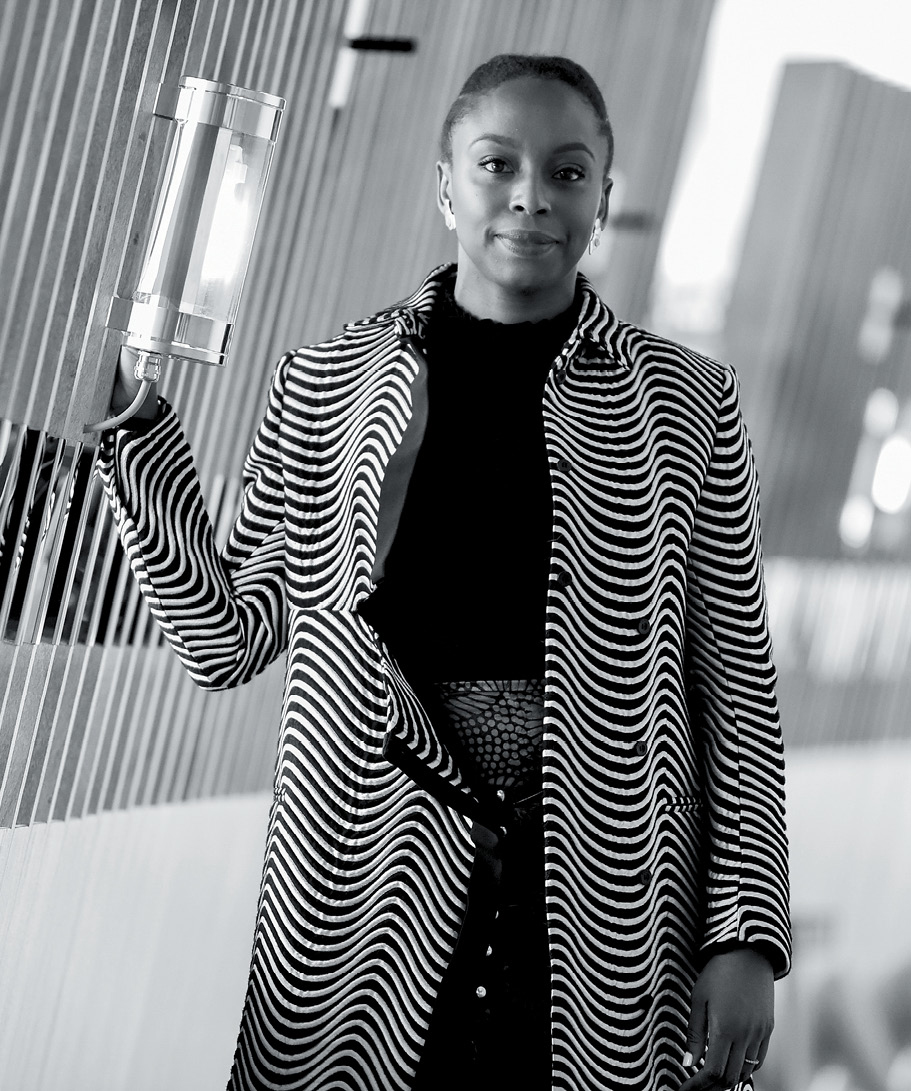Chimamanda Ngozi Adichie

Hillary
When Chimamanda Ngozi Adichie was nine years old, in school in Nigeria in the 1980s, her teacher made a proposition to the class: She would give them a test, and the student who got the highest score would be the class monitor. At this, Chimamanda’s ears perked up. Being class monitor meant getting to patrol the classroom, a long cane in hand, taking down the names of any troublemakers you noticed. She very much wanted the job.
Sure enough, she got the highest score on the test. But then, to her surprise, the teacher clarified that the monitor couldn’t be a girl—it had to be a boy. She had neglected to mention that earlier, because she assumed it was obvious. The boy who had earned the second-highest score was made class monitor, and the incident opened Chimamanda’s eyes to the way gender affects who gets ahead and who is held back. “Now, what was even more interesting about this,” she added later in a TED Talk, “is that the boy was a sweet gentle soul who had no interest in patrolling the class with the cane, while I was full of ambition to do so. But I was female, and he was male, and so he became the class monitor.”
From her childhood through the present day, Chimamanda has deliberately noticed and named insidious dynamics of racism and sexism. An early reader and writer, she loved British and American novels and copied their style in the pencil stories with crayon illustrations that she wrote for her mother. When she discovered African writers like Chinua Achebe and Camara Laye, her perception of the world shifted. “I realized that people like me, girls with skin the color of chocolate, whose kinky hair could not form ponytails, could also exist in literature. I started to write about things I recognized.”
“Stories matter. Many stories matter. Stories have been used to dispossess and to malign, but stories can also be used to empower and to humanize. Stories can break the dignity of a people, but stories can also repair that broken dignity.”
—CHIMAMANDA NGOZI ADICHIE
Chimamanda grew up in Nsukka, a college town in Nigeria, raised by a college professor father and university registrar mother—the first woman to hold the job. Her parents hoped Chimamanda would become a doctor, and she spent a year studying medicine before admitting to herself and her family that what she really wanted to do was write. She would go on to earn a master’s in creative writing from Johns Hopkins, then study African history at Yale. Her first play, For Love of Biafra, was published in Nigeria in 1998. In her typically funny, frank style, she has shrugged it off as “an awfully melodramatic play.” She was twenty-six years old when she published her first book, Purple Hibiscus, a coming-of-age story. Three years later, she followed up with Half of a Yellow Sun, a historical novel based on the Biafran War in Nigeria. After that came a collection of short stories, The Thing Around Your Neck, and the novel Americanah, about a Nigerian blogging on the topic of race in the U.S.
In 2008, Chimamanda won a MacArthur Fellowship. Five years later, she received a jaw-dropping recognition of a different kind when none other than Beyoncé, another gutsy woman, sampled her TED Talk, “We Should All Be Feminists,” in her song “Flawless.” Chimamanda’s book by the same title is filled with wry and wise observations about feminism.
“We teach girls to shrink themselves, to make themselves smaller. We say to girls, ‘You can have ambition, but not too much. You should aim to be successful, but not too successful, otherwise you will threaten the man.’ ”
—CHIMAMANDA NGOZI ADICHIE
During the 2016 presidential election, Chimamanda was frustrated with the way many of my supporters, especially women, were silenced online and in the press—so she wrote an essay speaking up for those who could not do it for themselves. When I saw her in 2018, she had recently published Dear Ijeawele, or A Feminist Manifesto in Fifteen Suggestions, and was full of insights about the connection between free speech, democracy, and feminism. She also wanted to talk about my Twitter bio. “The first word that describes you is ‘wife,’ ” she pointed out. “And then I think it’s ‘mom’ and then it’s ‘grandmother.’ And when I saw that, I have to confess that I felt just a little bit upset. And then I went to look at your husband’s Twitter account, and the first word was not ‘husband.’ ” She was right. I promised her I would change it when I got home, and that’s what I did.
When I told Chelsea, she said, “Chimamanda’s right! And I love that she just came right out and told you what she thought—and what you needed to hear.”
In addition to her smart, deliberate voice—on the page and off—I admire another gift of Chimamanda’s. She has the rare ability to sum up even the biggest societal problem swiftly and incisively and, in the next breath, offer a solution. In her 2009 TED Talk, she illustrated what she called “the danger of a single story,” and immediately proposed a new approach to inform and shape the way we perceive others. I can’t wait to see how she continues to do just that.